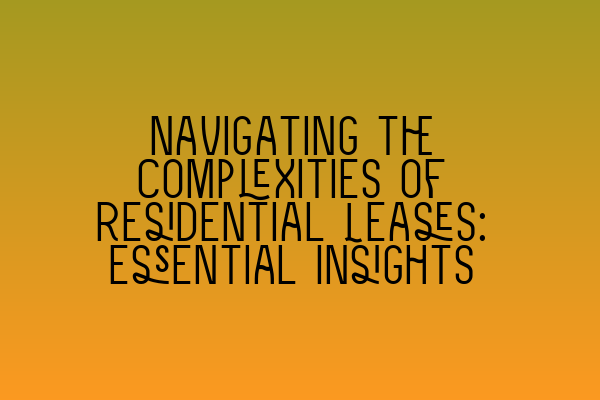Navigating the Complexities of Residential Leases: Essential Insights
Welcome to SQE Property Law & Land Law, where our team of solicitors specializes in providing expert advice on residential leases. Whether you are a tenant or a landlord, understanding the intricacies of residential leases can be daunting. In this blog post, we will provide you with essential insights on how to navigate these complexities and ensure that you are aware of your rights and obligations.
1. Understanding the Basics
Before delving into the more intricate details, it is crucial to have a solid understanding of the basic concepts surrounding residential leases. A residential lease is a legally binding agreement between a landlord and a tenant, outlining the terms and conditions of the tenancy. It typically includes information such as the duration of the lease, rent payments, maintenance responsibilities, and termination clauses.
2. Key Considerations for Tenants
If you are a tenant, there are several important factors to consider when entering into a residential lease. First and foremost, thoroughly read and understand the terms of the lease agreement before signing. Pay special attention to clauses regarding rent increases, repair obligations, and early termination.
Furthermore, make sure to clarify any additional costs that may be incurred during the tenancy, such as service charges or utilities. Understanding your rights as a tenant, such as the right to quiet enjoyment and the right to request repairs, is essential for a smooth and fair tenancy.
For more in-depth information on tenant rights and responsibilities, we recommend reading our related article on “SQE 1 Practice Exam Questions.”
3. Key Considerations for Landlords
If you are a landlord, it is crucial to ensure that your residential lease agreement complies with all legal requirements. Be transparent and provide a comprehensive written agreement that outlines both your and the tenant’s responsibilities.
As a landlord, you have the right to request a security deposit, which can serve as protection against damage or rent arrears. However, it is essential to adhere to strict legal guidelines regarding the handling and return of the deposit.
Additionally, understand your responsibilities as a landlord, which include maintaining the property in a safe and habitable condition, complying with health and safety regulations, and giving proper notice for inspections or repairs.
For a more thorough understanding of your obligations as a landlord, we recommend reading our related article on “SQE 1 Practice Mocks FLK1 FLK2.”
4. Lease Renewals and Extensions
Lease renewals and extensions can often bring about confusion and disputes between landlords and tenants. It is crucial to understand the procedures and requirements for extending or renewing a lease in order to avoid unnecessary complications.
As a tenant, it is important to communicate your intentions regarding lease renewal well in advance and ensure that both parties are in agreement regarding the terms and conditions of the extended lease.
Landlords should also be aware of their rights and obligations when it comes to lease renewals. This includes providing proper notice to tenants, negotiating any changes to the lease agreement, and adhering to rent increase restrictions.
For a more detailed guide on lease renewals and extensions, we recommend reading our related article on “SQE 2 Preparation Courses.”
5. Dispute Resolution
Inevitably, disputes may arise between landlords and tenants during the course of a residential lease. In such cases, it is essential to approach dispute resolution in a fair and lawful manner.
Mediation and negotiation are often recommended as the first steps in resolving disputes, as they can help both parties reach a mutually satisfactory agreement. However, in cases where resolution is not possible, it may be necessary to seek legal advice and consider alternative dispute resolution mechanisms or court proceedings.
Whether you are a tenant or a landlord involved in a residential lease dispute, our team of experienced solicitors can provide expert advice and guidance to help you navigate through the complexities of the legal process.
For more information on dispute resolution and legal support, we recommend reading our related article on “SQE 1 Preparation Courses.”
Conclusion
Residential leases can be complex and challenging to navigate, but with the right knowledge and understanding, you can protect your rights and avoid unnecessary disputes. At SQE Property Law & Land Law, our team of solicitors is dedicated to providing you with the essential insights needed to ensure a smooth and successful tenancy.
If you require further guidance or legal assistance with any residential lease matters, don’t hesitate to contact us. We have extensive experience in handling a wide range of property law issues, and we are committed to providing you with comprehensive and tailored solutions.
For more information on property law and land law, as well as important SQE exam dates, please visit our website.
